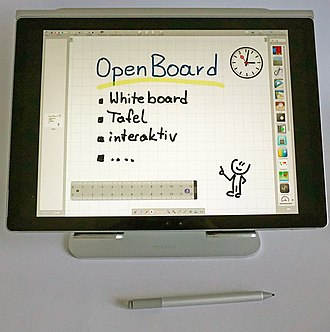OpenBoard
| OpenBoard
|
|
|---|---|
|
|
|
 OpenBoard 1.5.3 under Windows 10 in full screen mode |
|
| Basic data
|
|
| developer | Openboard |
| Publishing year | 2013 |
| Current version | 1.5.4 (2020) |
| operating system | Windows , macOS , Linux , Ubuntu |
| programming language | C ++ |
| category | Free learning software |
| License | GPLv3 ( Free Software ) |
| German speaking | Yes |
| www.openboard.org | |
OpenBoard is free software for interactive whiteboards that is compatible with almost all available digital boards and projectors and the associated remote controls, as well as with tablets. OpenBoard is a fork of Open-Sankoré and has been developed by the Service Écoles-Médias | service des écoles et médias of Geneva since 2014 .
history
The whiteboard software Uniboard was developed in 2003 at the University of Lausanne (Switzerland) and marketed in 2008 by a spin-off from the university, the company Mnemis SA. In 2010, the non-profit interest group for digital education in Africa (GIP ENA) bought the rights and published the software under the name Open-Sankoré (published under the open source license GPLv3 ). OpenBoard is a fork of Open-Sankoré 2.0 and has been developed by the Service Écoles-Médias | service des écoles et médias of Geneva since 2014 . The source code is available on GitHub.
Functions
In addition to the functions for simulating an electronic whiteboard (pen, marker, eraser), Openboard has additional options such as a virtual keyboard, applications (ruler, compasses, magnifying glass, calculator, function plotter) and interactive applications for designing exercises. Openboard documents can be exported in .ubz format or in Portable Document Format (PDF) and exchanged with other users. With the podcast option, the creation of the whiteboard image can be recorded together with the sound and saved as a whiteboard animation (video).
Expansion options
The functionality of OpenBoard can be extended by HTML5 applications. In French, applications are e.g. B. available from François Le Cléac'h. Additional applications translated into German can be found on the German-language OpenBoard page.
service
The operating concept is based on intuitive and efficient usability. In particular, it should also be aimed at teachers, schoolchildren and students who have no special technical knowledge. Any type of document can be inserted into the program (text, images, Flash animations, videos). Several screens (e.g. notebook and projector) can be used for the lecture. Classical methods are also available. For example, a virtual laser pointer can be used or content can be covered with a “mask” (as in a lecture with an overhead projector ).
languages
The program is currently available in the following languages: German, English, French and Italian. Extensions (applications) are available in a translated version on the German-language Openboard website.
Web links
- Official website of OpenBoard
- German-language instructions for Openboard
- OpenBoard on GitHub
- German-language applications and extensions to Openboard
